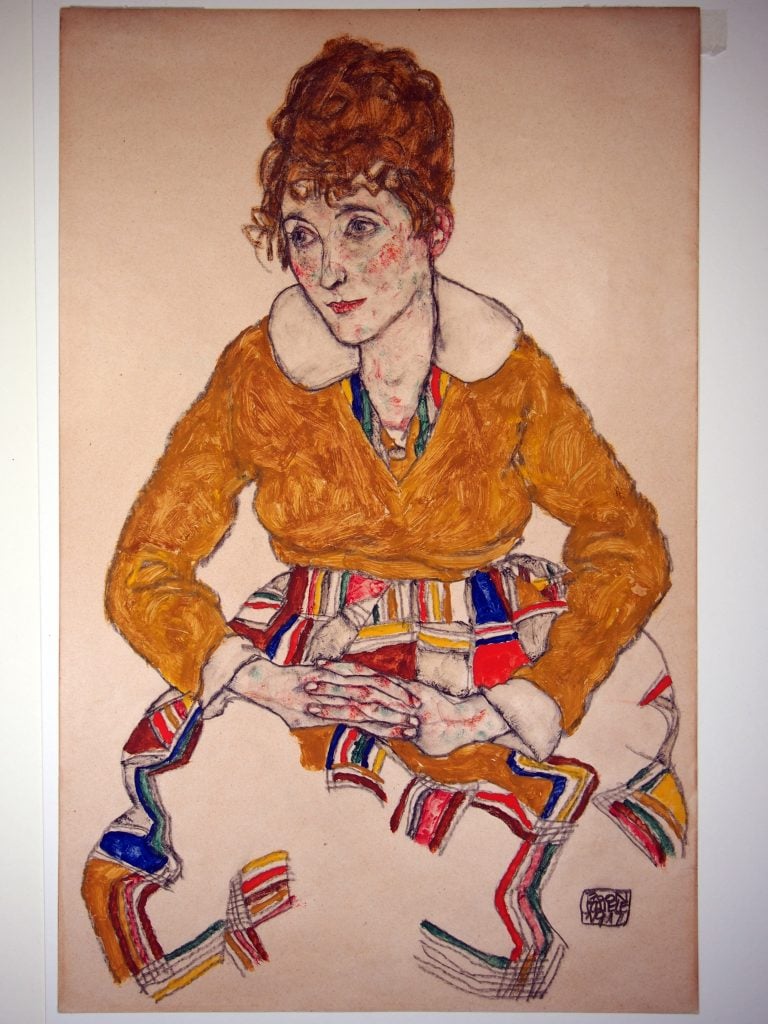Law & Politics
A Schiele Has Been Restituted to Heirs of a Jewish Art Collector, Ending a Three-Way Dispute
Top Schiele scholars have come head-to-head in this complicated, high-stakes three-way dispute.

Top Schiele scholars have come head-to-head in this complicated, high-stakes three-way dispute.

Jo Lawson-Tancred

A 1917 drawing by Egon Schiele of his wife Edith will be restituted to the heir of Jewish Viennese art collector Karl Mayländer, who was murdered by the Nazis. The ruling by the New York Supreme Court should resolve a particularly complicated three-way dispute—the very first case about Nazi-looted art to go to trial in the U.S.
Though much about the provenance of Portrait of the Artist’s Wife is murky, we know that, in 1964, the painting was acquired in London by the American banker Robert Owen Lehman, Sr., the last Lehman to head Lehman Brothers. In 2013, it was rediscovered in the Paris home of Aki Lehman, the ex-wife of Robert’s son Robin Lehman, having been recorded as missing for several decades.
It was handed over to the Robert Owen Lehman Foundation in the U.S. and, in 2016, sent for evaluation at Christie’s. The auction house checked the work against a database of looted artworks and alerted the heirs of two important Viennese art collectors, Mayländer and Heinrich Rieger, who had both known Schiele personally and had owned portraits of Edith, of which Schiele made dozens.
The question mark hovering over the painting’s provenance could not be easily resolved in the eight years since, with both sets of heirs arguing that their ancestor had owned the painting. A three-way lawsuit was initiated by the Lehman Foundation, defending its own claim to the work, in May.
The Lehman Foundation relied on the expert opinion of top Schiele scholar Jane Kallier, while the Mayländers had the support of another Schiele expert, Tobias Natter. The Riegers’ expert was Jonathan Petropolus, a renowned art historian specializing in Nazi-looted art. The only documentation available to build their case was decades old and relied on descriptions of the works in question.
Last Thursday, New York State Supreme Court Justice Daniel J. Doyle issued an 86-page ruling in favor of the Mayländer heirs.
According to their version of events, the textile merchant and eminent collector, who was himself portrayed by Schiele at least twice, is understood to have owned the portrait. In October 1941, he was deported to the Łódź ghetto, in German-occupied Poland, where he was killed. He had left his belongings with a woman called Etelka Hofmann, who eventually sold them after the war.
Doyle’s decision hinged on the Mayländer heirs proving that the work in question was acquired by Rudolph Leopold, founder of the Leopold Museum in Vienna, in 1960. This would match up with the description of a portrait of Edith in a sale contract handwritten by Leopold (the accuracy of which has been disputed by his widow). The work then re-entered the market via Galerie Galatea in Turin, Italy, and was bought by Marlborough Gallery in London in either 1963 or 1964.
Mayländer’s last surviving heir, Eva Zirkl, died earlier this year. The painting has therefore been awarded to the Susan Zirkl Memorial Foundation Trust, a charity dedicated to autism research.
“The recovery of artwork looted during the Holocaust is an important way to restore dignity and justice to Holocaust victims and their families,” said Oren Warshavsky, a partner with law firm BakerHostetler, who represented Zirkl. “We are thrilled that the Court’s disciplined and detailed review of the evidence resulted in the right decision.”
Schiele, who died of Spanish influenza at the age of 28 in 1918, was a celebrated Viennese painter who is often seen as a protégé of Gustav Klimt. His work has been at the center of several restitution cases. Last fall, a trove of Schieles were restituted to the heirs of Jewish collector Fritz Grünbaum, who lost his collection in 1938 when he was sent to Dachau concentration camp. He died there in 1941. Last month, an additional Schiele artwork was restituted to his heirs.